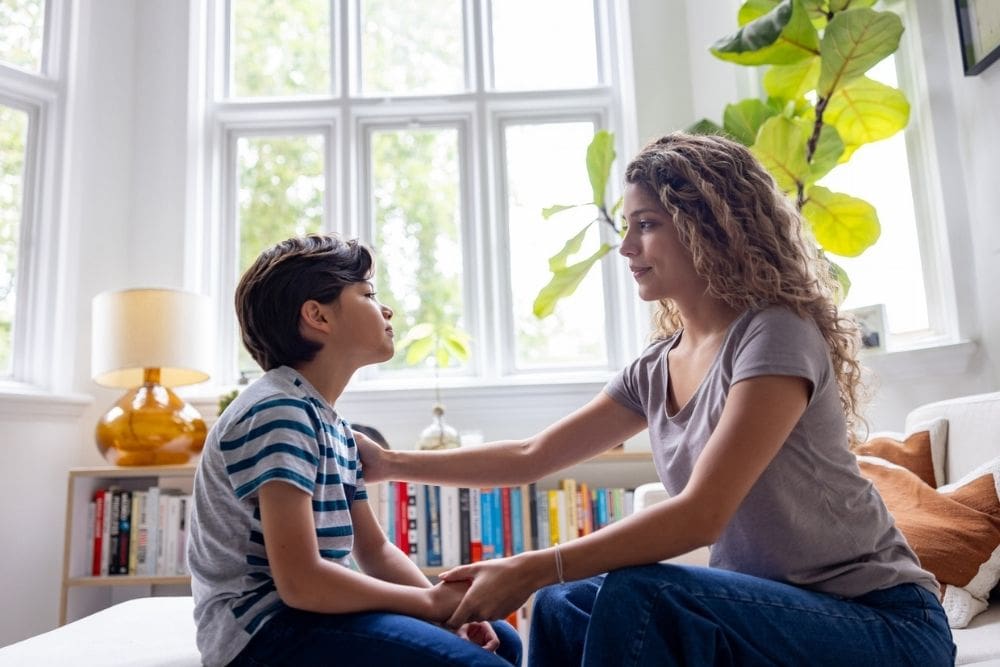As a parent, you want your child to feel safe, loved, and supported. But life doesn’t always go as planned. Whether you’re managing your own mental health challenges or noticing signs of distress in your child, starting conversations about mental health can feel overwhelming. Maybe you’re afraid of saying the wrong thing. Maybe you’re wondering if your child is too young to understand. But here’s the truth: talking to children about mental health is one of the most powerful things you can do to help them grow up emotionally resilient and compassionate.
Why You Should Talk to Your Child About Mental Health
Mental health affects how we think, feel, and act. It shapes how we handle stress, relate to others, and make choices. When children learn about mental health early, they are better equipped to understand their feelings and recognize when they or someone they care about needs support.
Here’s why these conversations matter:
- It reduces shame and stigma. Kids pick up on what adults avoid. If you never talk about mental health, your child might assume it’s something to be embarrassed about. But when you speak openly and calmly, they learn it’s okay to talk about tough feelings.
- It helps them feel less alone. When children understand that everyone has emotions—and that it’s normal to feel sad, anxious, or overwhelmed sometimes—they’re less likely to feel isolated.
- It creates a safe space. If your child knows they can come to you without judgment, they’ll likely open up when something’s wrong.
You don’t need to dive into clinical terminology to get the message across. Start by helping your child understand that mental health is just as important as physical health. Here are some key concepts to share, tailored to their age and maturity:
- Feelings are normal. Everyone has emotions. It’s okay to feel happy, sad, angry, or scared.
- Mental health can change. Just like you can catch a cold and feel better with rest and care, your mind can have hard days too—and there’s help for that.
- There’s nothing wrong with asking for help. Whether they’re struggling or see a friend struggling, kids should know that talking to a trusted adult is always a good idea.
- Kindness matters. Teaching children to be kind to themselves and others supports empathy and connection.
Use stories, examples from movies, or even your own experiences to make things relatable. A simple, “Remember how you felt nervous before your first day of school? That’s a normal feeling—and talking about it helped,” can go a long way.
According to the National Institute of Mental Health (NIMH), mental health is a vital part of overall health for both children and adults. When mental health issues are recognized and treated early in childhood, it can lead to more effective outcomes and help prevent long-term problems later in life.
What If You Are Experiencing a Mental Health Crisis
Sometimes, parents are the ones who are struggling. Depression, anxiety, or another mental health condition can make parenting feel incredibly difficult. You might wonder if you should hide this from your child or if it will just scare them.
But children are incredibly perceptive. They often notice when something feels “off,” even if they can’t put it into words. Being open, honest, and age-appropriate helps them understand that it’s not their fault—and that things can get better.
Here are a few things to keep in mind:
- Be honest, but reassuring. You don’t have to go into all the details. Something like, “Mommy is having a hard time right now, but she’s getting help so she can feel better,” is simple and truthful.
- Let them know they’re safe. Kids can internalize your pain. Reassure them that your love for them hasn’t changed and that they are not responsible for your feelings.
- Model self-care and asking for help. When your child sees you reaching out for support—whether through therapy, talking to a friend, or going to a hospital—they learn that it’s brave to take care of your mental health.
How to Start the Conversation
There’s no “perfect” time to talk about mental health—but you can create small windows of opportunity. These moments could be after a tough day at school, during bedtime chats, or while watching a show that touches on emotional themes. Keep the tone calm and inviting.
Here are a few conversation starters:
- You seemed a little quiet today. Want to talk about how you’re feeling?
- Have you ever felt sad or worried and didn’t know why?
Most importantly, listen. Resist the urge to “fix” everything right away. Sometimes, what your child needs most is to be heard and understood.
Building a Mentally Healthy Home
You can create a home where mental health is prioritized by:
- Modeling emotional honesty. Share how you feel and how you cope in healthy ways.
- Encouraging expression. Let your child draw, write, talk, or play out their feelings.
- Maintaining routines. Predictability helps kids feel secure.
- Celebrating progress. Praise your child for being open about their feelings or for helping others do the same.
You’re Not Alone
Parenting is tough, especially when mental health becomes part of the picture. But you don’t have to navigate it alone. At Creekside Behavioral Health in Kingsport, Tennessee, we support families with the tools, resources, and care they need to thrive—together.





